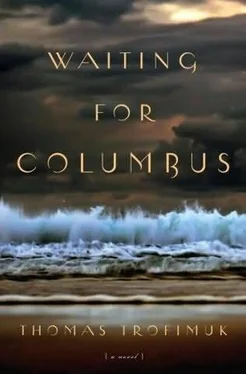“To the queen then.” Beatriz raises her glass.
“Yes,” Columbus says. “To Isabella.”
***
Two days later, just before he leaves for the university, Columbus makes one of his most important discoveries. He finds a crease in the chart-the one upon which he and Beatriz made love. He makes an important decision. He takes a huge leap of faith. He looks at his top chart. It’s one of the charts made by his brother, Bartholomew, who is in France seeking funding from a different royalty. Columbus decides the crease is the route to the Indies. He decides he will follow the map of his love for Beatriz. From the crease in the far western unknown area where he hopes to find the Indies, he draws a line back toward the known world, across the Western Sea, to find his starting point: the Canary Islands.
Emile places the TV remote on the bedside table. He’s been in Córdoba for two days-poking around, looking for something, anything that might be a clue to the whereabouts of his mysterious man. It’s 5 A.M. He crawls into the shower to try and shake off his dream, which was more a lucid memory. Perhaps the dream is a bit more violent than the memory. There’s more broken glass. More screaming. More shame.
It was six months after the shooting and he was slated to return to duty. Emile shows up at the Lyon office. Everyone is smiling and happy to see him back at work. He’s ushered into a meeting before he can get settled. In the boardroom, there’s a man wearing a bad tie and a cheap suit talking about the importance of something called an augmented business planning process and managing risk. There’s a three-day seminar on risk management this man highly recommends. He somehow segues into the vision and values of their organization. When he fires up his PowerPoint presentation, with whirling text and fading screens and headings that outline the levels of bureaucratic functioning of Interpol’s role in the overall security scheme for the European Union, Emile starts to lose control. At first it’s just a twitch. He’s holding tightly to a company coffee mug and the twitch jerks his hand-creates a splash that almost escapes the mug. He wants to run from the room before anything bad happens. He knows something bad will happen if this man continues his earnest presentation. Emile starts to actually see hazy silos of information, silos of processes, silos of small-brained bureaucrats like this man, and none of these silos communicate in person-they all e-mail each other, copy subordinates and sub-subordinates, obscure information; rewrite memos dozens of times, make simple memos into academic dissertations so laden with cover-your-own-ass modifiers that they become meaningless. Emile breaks into a cold sweat. His breathing becomes shallow and quick. He worries that he’s going to say something stupid. But he can’t move. At least not right away. Emile remembers thinking: It can’t last much longer. It’s got to be over soon. But it doesn’t end. The presentation goes on for another fifty minutes, with no end in sight. Finally Emile has had enough. The dull man asks if there are any questions. Emile stands up. “What is the relevance of any of this?” he says. He draws his gun and fires two shots at the projector, which is suspended from the boardroom ceiling. The projector falls and shatters the glass table, which collapses on top of the people who have taken cover under it. Emile remembers holstering his gun and going home. They let him go home. They admit his return to work was premature. His bosses insist on more therapy. He was apparently suffering from something called post-traumatic stress disorder. Nothing to be ashamed of, they said. Happens to the best of us.
In his dream about shooting the projector, there are glass windows all around-nothing made of glass ever makes it through his dream intact. In one version of the dream, the presenter gets shot. Just shot, not killed. His therapist had a field day with that particular wrinkle.
***
He’s been to most of the bars and cafés around the main roads that skirt the edge of Córdoba. He’s tried to stay away from the A-4, but he now finds himself in a small nook of a bar called El Gatito, just off the Autovia del Sur-the highway that runs mostly uninterrupted from Madrid to Cádiz.
Emile sticks his nose into the opening of the glass, inhales the peaty, sweet aroma of the whiskey, then looks up to meet Carmen’s eyes. “I have no doubt in my mind, addled as it is by this brilliant whiskey, that God is a human invention. We invented God, and now he’s got to go. It’s time we grew up.”
“I have no doubt in my mind that you are too much with the Scottish beverage,” she says.
The day he’d arrived in Córdoba, Emile had done a circuit of bars and cafés closest to the train station, asking his open-ended questions, gently prodding. “He probably has better Spanish than I do,” Emile would say, a line that always got them smiling, and added an immediate layer of trust. Emile used this self-deprecatory statement about his ability to speak Spanish when, actually, his Spanish is very good. As is his English. His Italian? Not so good. Spanish was a cradle language for Emile. His mother was Spanish; his father, French. There was a nanny for a few years, a woman who spoke English-loved American films. His limited Italian can be credited to a lover-long before his wife.
***
Emile had started to doubt this approach. Four days in Córdoba and nothing. He would be hard-pressed to say what it was exactly that caused him to strike up a conversation with an elderly man feeding the birds in the park just off Avenida de Cervantes. It was just after noon. He’d been on his way to visit Carmen at El Gatito. Maybe it was a hunch. It was more likely dumb luck. Perhaps it was the fact that this park was only a stone’s throw from the train station. Regardless of the motivation, the conversation paid off. The old man, who was wearing baggy gray flannel trousers, a pressed white shirt, and a black sports jacket, had seen a man wandering the street with a stick stuck into his belt like a sword. “It was a couple of months ago, maybe a little less than two months. He was talking to himself. Fighting demons, you know? He was dirty. Dirty hair and clothing. I thought he might be on something or drunk. But he was just strange.”
“What did he say, exactly?”
“Nonsense. Half sentences about sailing. Something about navigation. But there was something warm about him. He didn’t seem dangerous.”
The old man tosses a handful of crumbs onto the ground and immediately the pigeons are there at his feet. “This man said the North Star was not always true. He kept repeating this. He said he wanted me to remember that the North Star was not always true.”
“What do you think that means?” Emile says.
The old man looks over the top of his glasses at Emile. “He’s crazy. That’s what it means. He’s crazy, but nice. I gave him directions to Jaén. I told him about my brother-in-law’s place in Castro del Rio. It’s on the way to Jaén. But then you know this because you’re from Interpol. My brother-in-law rents a few rooms out. I don’t like my brother-in-law too much.”
“The North Star is not true?”
“Yes, he said it just like that. I felt sorry for him. I gave him a few euros.”
In the morning, Emile will follow the trail east. If this is my man, he’s certainly not traveling in a straight line toward Morocco. But this feels right. Emile can feel it in his gut.
***
Emile takes a gulp of his whiskey. “I’m drunk only on your beauty,” he says to Carmen. He stops. Finds her eyes again. “Tired lines like that do you a disservice, Carmen. I apologize. Perhaps I am too much with the Scottish beverage.”
Читать дальше











